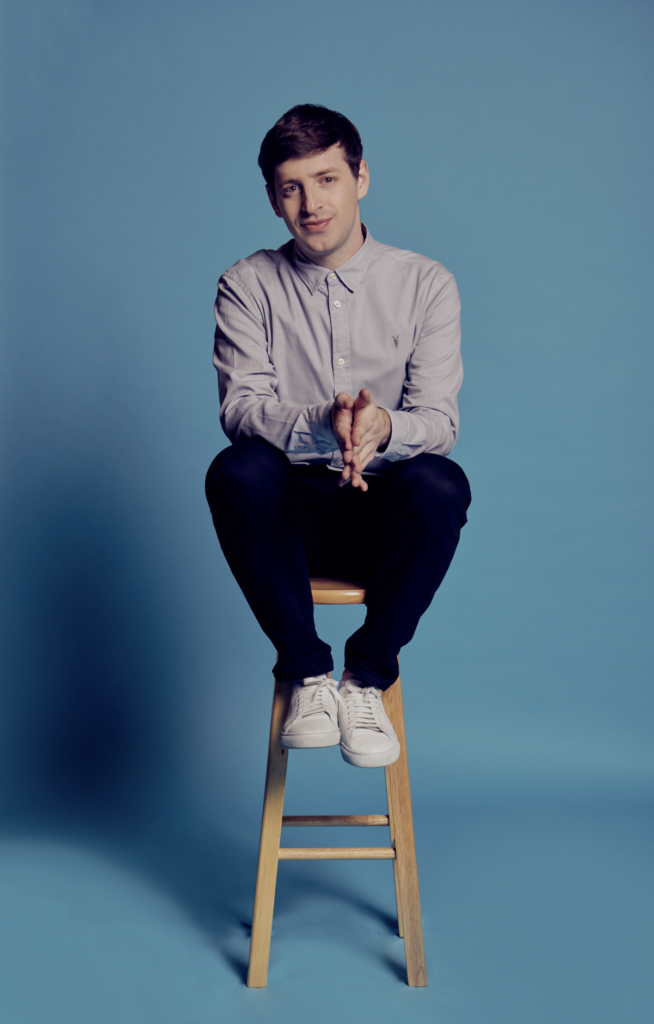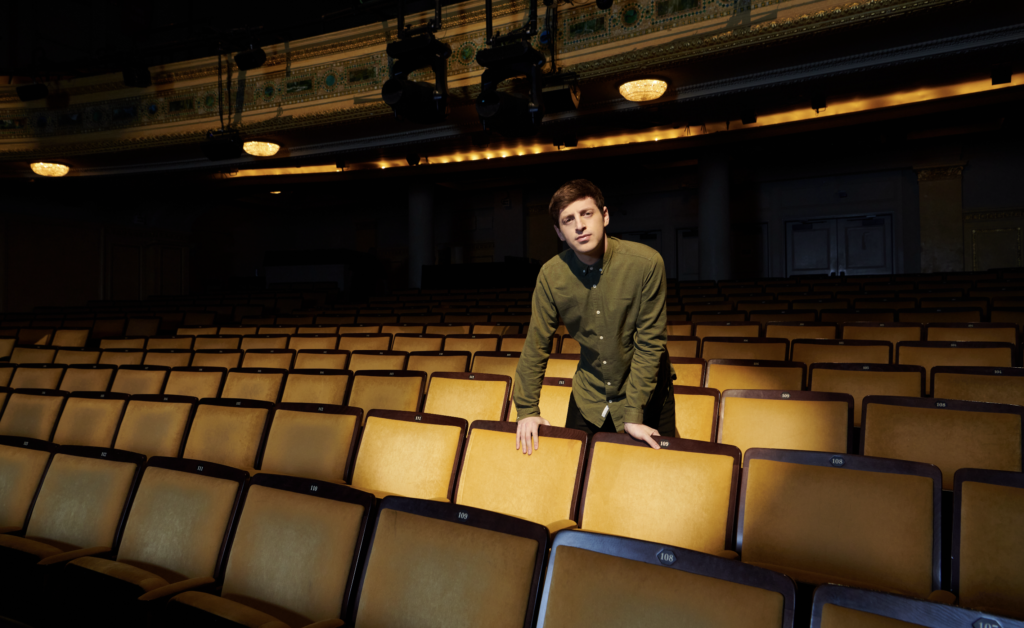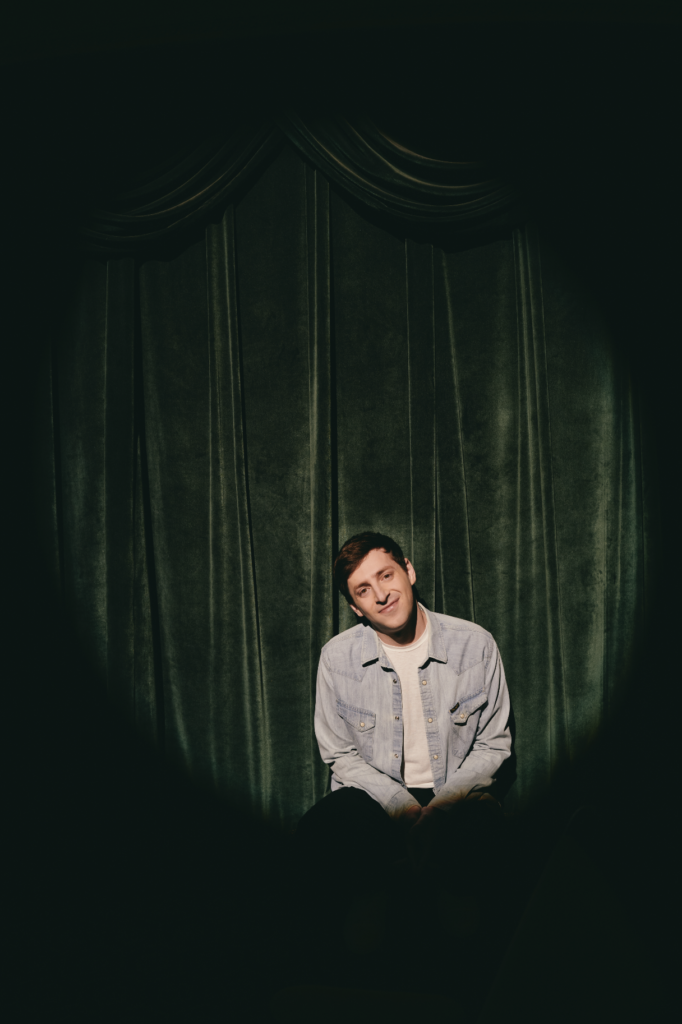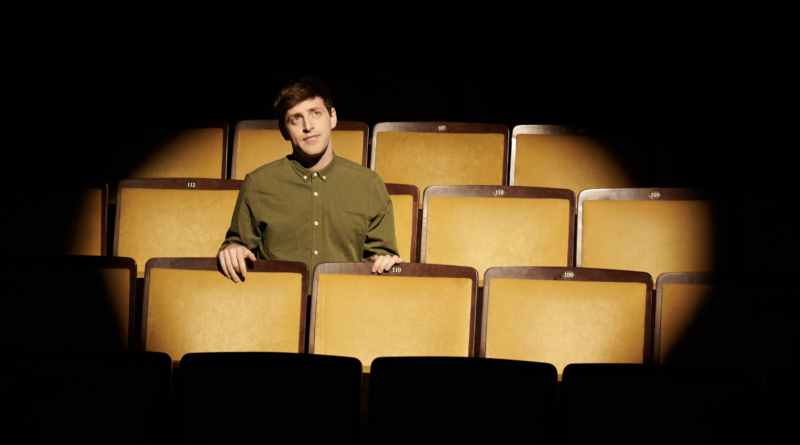Alex Edelman Is Still Figuring Himself Out, One Joke at a Time
The rising comedian reflects on his queer inspirations and his own identity
By Chris Azzopardi
 Comedian Alex Edelman is experiencing lots of firsts. For Edelman, many of those firsts, including questions that challenge him to reflect on his sexuality, are being lived out in public, even in interviews such as this one.
Comedian Alex Edelman is experiencing lots of firsts. For Edelman, many of those firsts, including questions that challenge him to reflect on his sexuality, are being lived out in public, even in interviews such as this one.
First there was his debut stand-up comedy show, “Millennial,” winner of the Edinburgh Comedy Award for Best Newcomer at the 2014 Edinburgh Festival Fringe, making him, yes, the first American to do so since Arj Barker won in 1997. Another first — covertly attending a meeting of White Nationalists amid anti-Semitic rhetoric pointed in his direction online — would later become part of his “Just for Us” show, which gave him his first Broadway run when it launched at the Hudson Theatre in the summer of 2023.
He then got his first review in the New Yorker when the show first hit the stage off-Broadway, at SoHo Playhouse in New York. “Uproarious! Among Edelman’s many strengths as a writer and performer is an exceptional eye for the absurd,” Rollo Romig wrote. The show ran internationally in London and Melbourne, and is now touring the U.S.
The “firsts” also extend to an appearance in late 2023 on “Jimmy Kimmel Live!,” where he met, for the first time, one of his favorites: Mariah Carey. On camera for our interview, Edelman holds up his phone to show me a text from his mom with a screenshot and this caption: “Your GF in People Magazine.” I asked him if he saw her in concert during her holiday run of shows, and I can’t tell if he’s serious, but he joke-whispers to me on camera that, “We looked into canceling a show to go see Mariah.”
Then there’s his Queerty debut; without knowing it until this interview, he first made it onto the queer media site in June 2023, Pride month, with the headline, “Will Broadway’s Alex Edelman be our new straight (bi?) BFF?” Edelman tells me he is very connected to queerness through close, loving connections he has in the community, even if he’s still figuring out where he might fit into that community.
As someone who didn’t even envision “Just For Us” on Broadway, what has it been like for you to see the show evolve from small venues to Broadway and now a national tour?
Magical. Halcyon. Unbelievable. Heartbreaking. Bewildering. Fulfilling. An escape. Such a textured set of emotions, and also to have to constantly re-engage with the material in different contexts is really interesting as a craft challenge, and an emotional one. But, yeah. It’s been really, really special. It’s been the most gorgeous experience. It’s really something.
Considering the comedic nature of the material, I’m struck by the word “heartbreaking.”
We lost our director [Adam Brace, who died in May]. My best friend, who I did the work with. So, on one hand, to use a horrific, horrific cliche, my community has really rallied around me. And, on the other hand, he’s missing all of it. Adam’s missing all of this. The show has been, thank god, rapturously received and people seem to enjoy it, and I love doing it. But part of the reason I love doing it is because it makes me feel close to my dead friend. Not to be too direct, but I’ve had two coffees today already. So, I’m very spicy.
Every time you get on stage, I imagine, you can’t not think about him.
It’s the 10 minutes before the show actually, and then the two or three minutes afterwards. Ten minutes before the show, my crew and I sit down and talk about what they think I should be doing differently on stage. And, we set five goals for the show. We’ve done that for hundreds of performances.
Comedy for me is about details and making sure that all the details are very looked after. I don’t take a single line for granted. There’s no word out of place, nothing stays there just because it was there before. Just because something existed doesn’t mean that it’s worthy. So, any line is a candidate for replacement if it all of a sudden stops working or the cultural context around it changes. So, things like that have happened to various jokes in the show, and they’ve fallen away or come in.
I wondered about how the material has evolved with personal and world events. As someone who has not seen the show, I can only base what I know on the show on lots of acknowledgement and reviews in major publications like The New Yorker.
Reviews have thankfully, I think, driven people to the show in a huge way. And, also Sarah Jessica Parker. When Sarah Jessica Parker put it on her ’gram, that sold out our entire New York run. She’s amazing. Talk about divas that I owe.
Sarah and Mariah.
SJP and Mariah. Are you kidding? Mariah was like, “I’m going to come.” And I was like, “You’re not going to come. I would die if you did.” All my comedy heroes have come to see it. Seinfeld came to see it and fucking Steve Martin and Billy Crystal. Billy Crystal’s huge for me.
When it comes to the show’s material, how have your experiences, even just sharing your life as a Jewish person, feel for you now during what’s happening in the Middle East with the Israeli-Palestinian war?
I think it’s become more visceral for me. There’s a question at the center of the show, which is, what is our place in the world? And I think an invitation to consider that in a way that is 90 minutes of jokes, is actually a really interesting and unique way to envision it.
Look, when I was in college, one of the theories of postmodern literature, which I studied, was the idea that you stand a much better chance of getting your arms around big concepts by viewing them in your peripheral vision or through the prism of something else. So, the questions of Jewish identity and what does it mean to be Jewish? I’m grateful that I’m doing a show that’s about assimilation, or about people’s place in the world.
Because the show has had a lot of relevance for people who are not just Jews. It’s found purchase with queer people and Muslim people and even a guy who told me he was from a family of musicians and always wondered if it should mean more. And I’ve had lots of people, Jews and non Jews, come up to me to tell me that the show has been an escape for them in L.A. here, and in San Francisco, where I did it for a while. So, look, I’ve changed some things in the show. I open with a joke that addresses it, but I think the show’s been an escape. But comedy is a great way to Trojan horse things. Sugar makes the medicine go down. And I think that the show has had that effect on people, thank god. I’m really thrilled by that.
You mentioned recognizing that you have a bigger queer audience now. I mean, Thanksgiving wasn’t all that long ago, so you technically just came out all over again. Congratulations!
[Laughs.] So, if you’re watching or listening or reading and you don’t know, I did this joke in 2015 on television in Australia about how I have a homophobic uncle. And so, I come out of the closet on Thanksgiving, every Thanksgiving. It’s like a description of doing it one year, which was 2014, 2013 maybe? I can’t remember. And the joke’s gone viral a bunch of times. When it started, everyone felt like the discourse was a lot of straight people going, “This is offensive.” And a lot of queer people being like, “This is awesome.”
And now, I reposted it the other day, because it was Thanksgiving, just to see what it would be like. Not a single negative comment. I was thinking about that. I was like, “I wonder if we’ve gotten more nuanced in our understanding of how jokes work, or if we’ve gotten more nuanced in our understanding of how queer experiences work?” It’s really interesting watching people’s response to the jokes. Jokes can be such good bellwethers or such good weather vanes for how people feel about certain social issues and our discourse and how we talk to each other. And no one has ever in person said to me that that joke has offended them. I have had a couple of people come up to me to tell me that that joke made them come out to their families.
 To me, the point of that joke was that whether you’re just an ally or not, it’s important to have those hard conversations with people around you who you think may be homophobic.
To me, the point of that joke was that whether you’re just an ally or not, it’s important to have those hard conversations with people around you who you think may be homophobic.
There was a line in the joke that I was always very proud of, which is, “They say coming out is the hardest thing a young person can do. And it is, but it gets easier every single year.” That’s not mocking the idea of young people coming out. It’s very hard. There’s something special about making a point that everyone can laugh at, even though it’s a divisive point.
I have my own sexuality and my own journey around my own sexual identity is something that I hold very closely to my chest and I’m very private about. And for reasons I don’t completely understand, but sometimes get into in my art. But queer people and trans people are huge, enormous parts of my life. My partners, my closest friends, family members. It’s a really, really special thing to me.
Is it easier to talk about that aspect of your life through your work?
Yes. I have a joke in the show where I go, “If I was raised secular, I think I’d consider myself bisexual, but, because I was religious, I consider myself straight with some secrets.” And one of the few knocks on the show said, “I wish that the show had talked more about that.” The funny thing is, when I wrote the line, that was exactly how comfortable I was talking about it publicly. But I have lots of deep, deep conversations with queer people, particularly queer Jews in my life about sexuality in that intersection.
When did you write that joke?
2021. A couple of years ago.
 You have acknowledged that perhaps if you weren’t religious and you didn’t grow up in Boston and lived in New York or maybe even West Hollywood that your experience with your own sexual identity might be much different.
You have acknowledged that perhaps if you weren’t religious and you didn’t grow up in Boston and lived in New York or maybe even West Hollywood that your experience with your own sexual identity might be much different.
Yeah. I think that’s 1,000% true. But the people that I spend time with and draw wisdom from are people like Benj Pasek, an incredible songwriter, and Aluk, one of the great comics. And they’re queer as well. I’m not just listing my queer friends; I’m talking about people for whom their queerness is an animating force and who think as deeply about their queerness as anyone thinks about a vector of their identity. Watching people go through that journey of interrogation, in particular people I met through Benj, prompted a methodology of self-interrogation for me.
I feel like what you’re asking me is if what you’re saying is OK?
I’m not asking you. I’m asking the most unkind people who might be viewing this or reading this and being like, “That’s not fair.” I’m not being like, “I’m friends with Jake Cohen, so I can speak with impunity about the way queer people move in the world,” as someone who is very close to the vest about their own queerness.
As someone who’s a rising comedian, is how open you are about your life something you have to take in consideration now?
I don’t know that I’ve ever talked about this in an interview, but I feel a tremendous need for privacy around aspects of my process. And I feel a tremendous need for privacy around how I feel about other comedians. And I feel a tremendous need for privacy about certain … I don’t know. I guess, some topical things feel really private to me, even if they’re not the spiciest topics.
Other topics that are spicy, I don’t feel the need to be private about at all. I feel like I have a very heterodox understanding of what I do and don’t need privacy for. And I like that. But, even recently, just talking about my identity as a Jew, that’s new to me. And even talking at all about my sex life, that’s new to me. And talking about all of this is very, very new.
These are good questions, just given that they’re not the same questions, which is like, “What was it like walking into that room?” And I’m like, “Well, I did a 90-minute show about it that you can see.”
Once you are written about in Queerty, I feel like there is automatically some public interest in your sexual identity.
Have I been written about in Queerty?
Yes.
Oh my god. Wow! Don’t think I’m not looking that up as soon as I get off.
Chris Azzopardi is the Editorial Director of Pride Source Media Group and Q Syndicate, the national LGBTQ+ wire service. He has interviewed a multitude of superstars, including Cher, Meryl Streep, Mariah Carey and Beyoncé. His work has also appeared in The New York Times, Vanity Fair, GQ and Billboard. Reach him via Twitter @chrisazzopardi.

